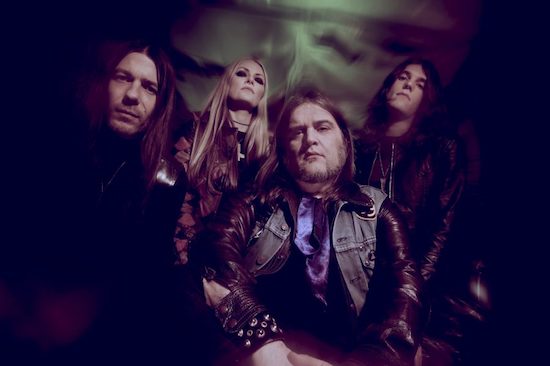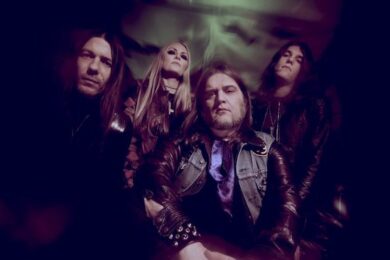Electric Wizard guard the rusted iron gates of an obscure outpost in a low-lit galaxy of VHS sleaze, demented biker lore, Lovecraftian mythos, dark psychedelia and ominous West Country folk history wreathed – forever and a day – in extravagant plumes of ganja smoke. Since 1993 they’ve traversed the low, the slow and the scuzzily bizarre, redefining both how nasty sub-nautical doom could get on 2000’s seminal Dopethrone and how hypnotically reverent – and truly psychedelic – it could go on Witchcult Today, Black Masses and 2014’s fearsome aural succubus Time To Die. They go beyond doom, of course. To fanatics, record collectors and proper heads alike they are one of the greatest heavy metal bands in the world.
Movies have, of course, always been a vitally important part of the wider Electric Wizard legend. Band leader and guitarist/vocalist Jus Oborn is a longtime scholar of dank celluloid counter culture, taking particular inspiration from the souring of the hippy dream and the attendant musical and movie thrills unleashed by bands and filmmakers who took a similar muse during the early 1970s. Their album thanks lists open a beguiling wormhole: ultra-obscure British sex comedy auteur Derek Ford; pulp American magazine publisher Mad Myron Foss; Spanish trash master Jess Franco; Straw Dogs actress Susan George – all are name checked as talisman for the curios while songs like ‘The Dunwich Horror’, ‘The Hills Have Eyes’ and ‘Venus in Furs’ make direct reference to their namesake movies.
Theirs is a world of fusty psychotropic vision: we’re talking diggers, lifers. When Electric Wizard curated Roadburn in 2009 they screened The Sinful Dwarf at heinous volume, invited Genesis P Orridge to perform with Psychic TV and got The Pretty Things to play. The new album – Wizard Bloody Wizard – comes at the end of a tumultuous few years. Legal battles and lineup changes surrounded their last record – 2014’s Time To Die – but Wizard Bloody Wizard offers something of a line in the sand under those difficulties. It’s one of the most direct albums the band have made, more explicitly exploring the fuzzed-out garage and blues rock influences – early Alice Cooper, MC5, Grand Funk, Blue Cheer – that have always been a part of their sound.
”Time To Die was very much a depressing suicidal kind of album’ explains Jus Oborn as we crack the first of many beers at Spinefarm’s West London headquarters. ”No glimmer of light. And that’s as far as you can go unless you want to start to doing heroin or actually kill yourself (laughs). The new record is about get back to being a band, to sonically get our message to more people. I think there are a lot of people who feel alienated and fucked off with the world. Electric Wizard is the tonic for all that. The art and music I enjoy has a deeper meaning behind it; a deeper resonance. I find the term horror restrictive. Nowadays it has implications beyond what I consider horror. It isn’t what I like – I’m not into gore and seeing people’s guts torn out for the sake of it- all that stuff is just a rollercoaster ride. It can be fun but there isn’t any mystique to it. The films I’ve picked here… I’ll watch these hundreds of times, just like I’ll listen to an album hundreds of times – you notice different levels, whether intended or not”.
Electric Wizard’s new LP Wizard Bloody Wizard is out on 10th November. To begin reading the Baker’s Dozen please click the image below



